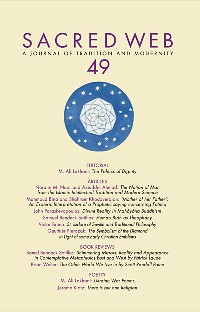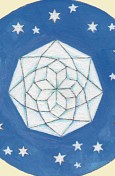Sacred Web will cease publication after issue 50
Sacred Web 49
Editorial:
The Politics of Dignity
By M. Ali Lakhani
‘Politics ennobles when it elevates human dignity. If it ceases to adopt the lens of inner worth, it risks losing its moral compass and ... undermining what it means to be human.’ Arguing that any sustainable politics has to be rooted in the ethics of dignity, the Editorial examines the metaphysical foundations of human dignity, the relationship of politics to human nature and to religion, and to key ideas such as freedom and equality, individuality and pluralism. Read more...
Articles
The Notion of Man from the Islamic Intellectual Tradition and Modern Science
By Noraini M. Noor and Aziuddin Ahmad
The essay considers two notions of man based on two worldviews, the Islamic intellectual tradition and modern science. In the former, God is the ground of being and all that exists are nothing other than His Names and Attributes. In the latter, modern science has reduced man to merely an epiphenomenon of brain activity, prioritizing the body over the immaterial soul. The authors compare these two views of man with respect to how each perceives the world, and they highlight the conflation that usually occurs in writings on man, and offer their perspective in understanding who man is. Read more...
‘Mother of her Father’: An Esoteric Interpretation of a Prophetic saying concerning Fātima
By Mahmoud Bina and Shahram Khodaverdian
In this article, the authors reflect upon the metaphysical and esoteric significance of a highly symbolic and paradoxical saying of the Prophet of Islam regarding his daughter, Fātima, according to which ‘Fātima is the mother of her father.’ As the Shakti of the Prophet, Fātima represents a personification of the all‐embracing divine Substance in a double relationship with the Prophet who is a personification of the Logos. Read more...
Divine Reality in Mahāyāna Buddhism
By John Paraskevopoulos
It is often claimed that Buddhism denies the existence of an abiding continuity that transcends our realm of impermanence and dissatisfaction. However, this is neither an accurate nor intelligible account of ultimate reality in this tradition – especially in its Mahāyāna form, which offers a more positive and compelling approach to religious understanding; one that indeed affirms our perennial quest for the eternal in the midst of transience. Read more...
Human Birth as Theophany
By Samuel Bendeck Sotillos
The significance of the gift and responsibility of a human birth is often not sufficiently appreciated in the modern world. In traditional thought, birth in this world expresses the mystery of manifestation and the human condition. According to the adage, an ‘unexamined life is not worth living,’ this essay reflects on the importance of authentic self‐knowledge in order to understand the meaning and purpose of our existence. Seeking to counter secular narratives that prevail today regarding what it means to be human, it considers how the world’s spiritual traditions view birth as a divine disclosure which is the basis for a true ‘science of the soul.’ Read more...
St. Isidore of Seville and Traditional Philosophy
By Victor Bruno
The essay contends that Medieval, pre‐Scholastic philosophy, which is often discredited by historians of philosophy and modern philosophers alike, is a creditable – indeed, a vital – philosophy. The author considers the example of the Medieval, pre‐Scholastic philosopher, St. Isidore of Seville, who played an important role in the establishment of Scholastic philosophy and in the synthesizing of the traditional philosophies of his predecessors, both pagan and Catholic. After providing an overview of aspects of his work and framing him in the traditional cosmology of ancient philosophy, the essay considers why modern commentators have difficulties in assimilating his philosophy, as well as that of other pre‐modern philosophers. Read more...
The Symbolism of the Diamond in Light of some Early Christian Emblems
By Gauthier Pierozak
The adamantine property, brilliance and clarity of diamonds is well‐ known to jewelers and collectors alike, but the gem’s profound symbolism is less well known. Drawing on notes from the archives of French archeologist and symbologist, Louis Charbonneau‐Lassay, and on other writings of natural history, metaphysics and theology, the essay surveys the core meanings of the diamond’s symbolism, including its esoteric, cosmological and numerological significances. Read more...
Book Reviews
Shimmering Mirrors: Reality and Appearance in Contemplative Metaphysics East and West by Patrick Laude
Reviewed by Samuel Bendeck Sotillos
The Other World We Live In by Scott Randall Paine
Reviewed by Brian Welter
Poetry
Ukraine War Poems
By M. Ali Lakhani
There is but one Religion
By Jerome Klotz



